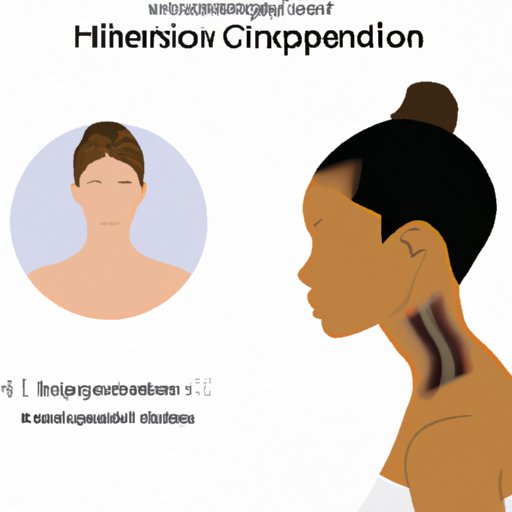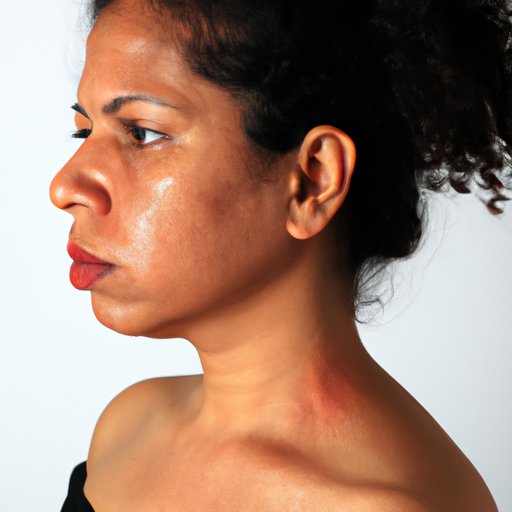I. Introduction
Have you ever looked in the mirror and wondered why your neck appears blackened or darker than the rest of your body? Although it may seem like a minor concern, a dark neck can be a sign of a more serious underlying condition or a result of skin damage. The purpose of this article is to explore the common causes and treatments of a black neck, as well as provide information on how to prevent further darkening and address the psychological impact of insecurity.

II. Understanding Hyperpigmentation: Common Causes of a Black Neck
Hyperpigmentation is a condition that occurs when the skin produces excess melanin, resulting in patches of discoloration that can range from brown to black in color. There are several common causes of hyperpigmentation on the neck, including:
- Exposure to the sun
- Hormonal changes
- Inflammation or injury
- Genetic factors
To identify hyperpigmentation on the neck, look for areas of darkening or patchiness that appear different from the surrounding skin. Hyperpigmentation can also occur on other areas of the body, such as the face and hands.
III. From Obesity to Diabetes: Exploring Health Conditions Linked to a Dark Neck
While hyperpigmentation can be a standalone condition, it can also be a sign of underlying health issues. Obesity and diabetes are two conditions that have been linked to a dark neck.
Obesity can cause darkening of the skin due to the friction and rubbing that occurs between skin folds, resulting in a condition known as acanthosis nigricans. Diabetes can also cause acanthosis nigricans, as well as other skin conditions such as diabetic dermopathy or necrobiosis lipoidica diabeticorum.
Prevention and treatment options for these and other related health conditions may involve lifestyle changes, such as incorporating regular exercise and a balanced diet, and seeking medical treatment to manage underlying conditions.
IV. Melasma: The Skin Condition That Could Be Causing Your Black Neck
Melasma is a skin condition that causes irregular patches of brown or gray-brown pigmentation, most commonly on the face and neck. The condition is more prevalent in women and can be triggered by hormonal changes, sun exposure, and genetics.
Treatment options for melasma may involve a combination of topical creams, chemical peels, or laser therapy. It’s important to note that some individuals with darker skin tones may be more prone to pigmentation changes and should consult with a dermatologist for personalized treatment options.
V. DIY Remedies: Natural Ways to Lighten a Dark Neck
For those looking to lighten a dark neck without medical intervention, natural remedies may offer some relief. However, it’s important to note that natural remedies may not be effective for all individuals and can take longer to show results. Additionally, some remedies may be harmful if used in excess or not used properly.
Some natural remedies that may help lighten a dark neck include using lemon juice, aloe vera, or apple cider vinegar topically and regularly exfoliating the skin. If trying these remedies, it’s important to first test them on a small patch of skin to avoid irritation or adverse reactions.
VI. The Impact of Sun Exposure: How to Avoid a Black Neck in the Summer
One of the leading causes of hyperpigmentation is exposure to the sun’s UV rays. To avoid a darkened neck in the summer months, it’s essential to invest in sun protection measures.
Recommended sun protection methods include using broad-spectrum sunscreen with an SPF of at least 30, wearing protective clothing such as hats and long-sleeved shirts, and seeking shade during the peak hours of the day.
VII. Should You See a Dermatologist? How to Decide If Your Black Neck Requires Medical Attention
While some cases of hyperpigmentation can be treated with natural remedies or lifestyle changes, others may require medical attention.
Criteria for seeing a dermatologist regarding a black neck can include changes in size, shape, or color of the darkened skin, persistent or severe itching or irritation, or symptoms that affect your quality of life. During a dermatology appointment, a doctor may perform a skin biopsy or suggest treatments such as prescription-strength creams or laser therapy.
VIII. The Psychological Effects of a Black Neck: Coping with Insecurities and Finding Confidence
Living with a black neck condition can impact one’s mental health and self-esteem. The insecurity and feelings of self-consciousness may limit an individual’s participation in social activities, work settings, and personal relationships.
But coping with these feelings is possible. Finding emotion-focused coping strategies such as exercise, meditation, and talking to a trusted friend or therapist can help manage anxiety and improve mental health. Additionally, cultivating self-confidence is essential to enhance personal well-being and challenge negative self-image.
IX. Conclusion
In conclusion, a black neck may seem like a cosmetic problem, but it can also be a sign of an underlying health condition. Understanding the common causes and treatments of hyperpigmentation, melasma, and the impact of sun exposure can help prevent and manage the condition. Additionally, seeking medical attention or exploring natural remedies can help facilitate healing. Lastly, coping with the psychological effects of a black neck requires embracing self-care and finding support.
If you are concerned about the appearance of your neck, we encourage you to seek professional medical advice.
